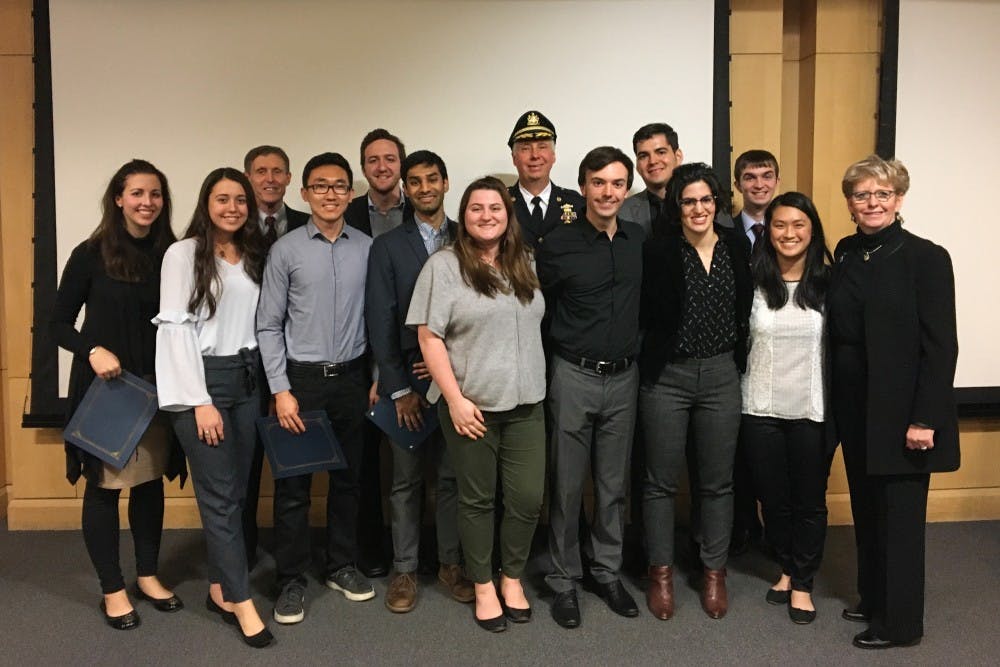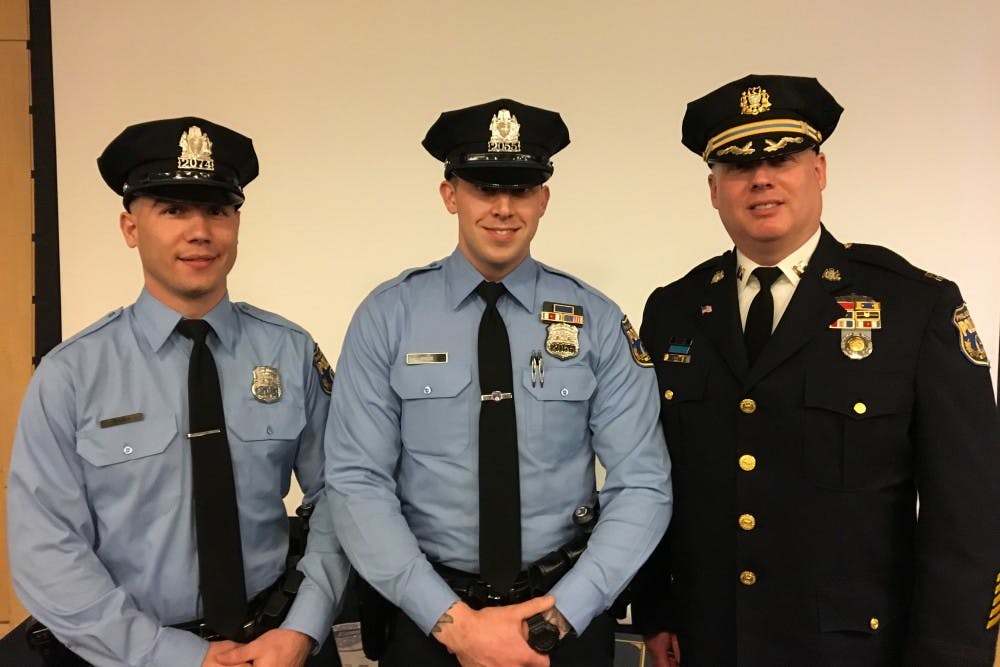
MERT seniors with Penn Police Chief Maureen Rush at the Department of Public Safety's commendation ceremony.
Credit: James MeadowsAfter more than six months of officers working without a contract, the Penn Police Association and Division of Public Safety have decided upon a new collective bargaining agreement.
Craig Carnaroli, Penn's executive vice president, took the stage at an annual ceremony Wednesday to honor community outreach and heroism and to announce the new development in the ongoing PPA negotiations with DPS.
“It was a long contract process, probably longer than anyone would’ve liked, but I’d like to thank the PPA for accepting the agreement and your patience in that process,” Carnaroli said. “These are always not the easiest things or the funnest things to do, but we got through and we got through together.”
The contract between the PPA and the University expired on July 31, 2017 and until this point had not been renewed since representatives from the union and DPS had not been able to agree on the terms of the contract.
Vice President for Public Safety and Superintendent of the Penn Police Maureen Rush, in her final remarks, took a moment to reflect on a "little bit of a rough year" that the University had undergone.
The ceremony serves as a way for Penn's Division of Public Safety, Undergraduate Assembly, and the Graduate and Professional Student Assembly to recognize and celebrate members of campus safety for watching over and protecting the community.
As officers were called up to receive commendations, letters of recognition, and unit citations, their superior officers recalled moments of service including community outreach, in-depth investigations, foot chases, and sometimes, moments when life and death hung in the balance.
One captain recalled a harrowing account on Sunday, Nov. 12, 2017, when officers and doctors were able to save the life of a Penn student who had tried to take his own life by ingesting a formula of sodium nitrate and prescription drugs.
One of the responders to that case was Dr. Joshua Glick, who only eight years ago was a Penn undergraduate and chief of the student-run Medical Emergency Response Team.
When Glick was the chief of MERT years ago in 2010, the club was merely four years old and was made up of only a couple dozen members. But at this year's ceremony, there were 23 seniors accepting awards for their time serving in MERT — many of whom planned to follow in Glick's steps by heading to medical school after graduation.

Philadelphia police officers Shaun Nash (left) and Ray Brook with Captain Greg Riley at the DPS Commendation Ceremony.
In 2017 alone, according to Eugene Janda, DPS' chief of Fire and Emergency Services, MERT responded to 431 dispatches and logged over 11,000 duty hours responding to medical emergencies and conducting campus-wide safety sessions.
In 2017, there were seven student deaths. Rush acknowledged three figures who are "always on the front lines" of every passing tragedy: Patricia Brennan, DPS' director of Special Services, Chaz Howard, the University chaplain, and Sharon Smith, the director of Student Intervention Services.
"There's not a whole lot we can say other than thank you," Rush said. "You are on the front lines; you do it with grace."
As the ceremony came to a close, Chaplain Howard left campus' protectors with a heartfelt benediction.
"Go out and make an emotion or relational connection," he said. "If you do, maybe we can heal some of the brokenness in our country and our world."
Correction: A previous version of this article indicated that there were ten student deaths, seven of which by suicide, in 2017. This version now indicates that there have been seven student deaths in 2017. The Daily Pennsylvanian regrets the error.
The Daily Pennsylvanian is an independent, student-run newspaper. Please consider making a donation to support the coverage that shapes the University. Your generosity ensures a future of strong journalism at Penn.
Donate







